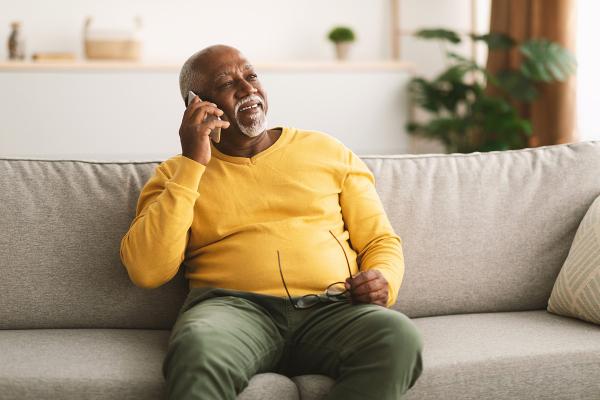
It may be time to get your hearing checked. AARP Hearing Solutions makes it simple. Find a provider today.
You suspect your spouse has hearing issues. But they’re not convinced. Here’s how to nudge them to get the help they need.

Is this going on at your house? Every time you watch TV together, your spouse turns the volume up so loud you can’t enjoy the show. Or perhaps you ask them a question when they’re doing something else, and they don’t answer.
Or maybe they keep telling you to speak up and stop mumbling.
Whatever the scenario, it’s frustrating for both of you. You’re almost sure your partner has trouble hearing. But they don’t think there’s anything wrong. It can even cause tension in your relationship. All you want is for them to get help so things can go back to normal.
Before any of that happens, you have to convince your spouse to get a comprehensive hearing exam and consultation. And that may be tough. If you belong to AARP®, you can request a no-cost hearing exam and consultation through AARP® Hearing Solutions™ provided by UnitedHealthcare Hearing.
“We hear these concerns a lot,” says Amanda Langham, Au.D. She’s an audiologist and owner of Central Texas Hearing Center in Austin. “We say that the spouse is the best person to raise the red flag on possible hearing loss. They care a lot about the person and are probably the ones who have the most conversations with them.”
First, it’s good to know the signs of hearing loss. That way, you can share them with your partner. Then get tips so they can get the help they need.

It may be time to get your hearing checked. AARP Hearing Solutions makes it simple. Find a provider today.
Many people don’t like to admit they’re losing their hearing. But if your partner is showing these signs, there’s a good chance that they have some degree of hearing loss. Here’s what to watch for, according to the National Institute on Aging:1
A hearing problem may get worse if it’s not treated. And when one person has trouble hearing, it could take a toll on your relationship. People who can’t hear well may feel frustrated or even become withdrawn or depressed.1
It’s important that your spouse realizes that they may have a hearing problem. Here are some tips to get them there.
Tell them they’re not the only ones. Hearing loss is a way of life for many people in their 50s and beyond. Knowing that there are so many others with hearing loss may help your partner feel less alone. In fact, 1 in 3 adults between the ages of 65 and 74 have hearing loss. About 1 in 2 over 75 have hearing loss.2
Make a gentle, loving request. Dr. Langham recommends starting the conversation this way: “I love you, and I notice that you’re missing out on parts of conversation. It’s not worth the struggle. Let’s go fix that.”
After all, hearing loss is a problem that has a solution. “You can be a supportive voice in this process,” she says.
Be honest about how their hearing loss affects you. Hearing loss has a big impact on a couple. Communication is important for healthy relationships. And hearing loss may derail those interactions.
Gently point out to your partner that you’ve noticed that whenever you have a conversation, they don’t always seem to understand you. Or they ask you to repeat yourself. It’s yet another way of bringing up their hearing loss.3
Let them realize it on their own. Are they still not ready to admit they need help? “Sometimes someone isn’t ready until they have an experience that makes them say, ‘Oh, I don’t want to do that again,’” says Dr. Langham. “We hear stories of someone not being able to hear their grandkids or struggling to hear at a dinner party and they don’t want to deal with that anymore.”
Of course, it doesn’t have to be so hard. If your partner can agree to get a hearing exam, that’s a win. And if the hearing care professional recommends hearing aids, they can talk to your spouse about the benefits.
There are so many new, high-tech solutions to treat hearing loss these days. So, keep the dialogue going with your partner.
One day, they may surprise you by making an appointment with a hearing care professional.
Ready to request a hearing exam and consultation? AARP Hearing Solutions has a national network of hearing care professionals. Request an appointment.
Sources
Information is for educational purposes only and is not a substitute for the advice of a licensed medical provider. Consult your provider prior to making changes to your lifestyle or health care routine.
AARP Hearing Solutions is available to all AARP members and does not require a health insurance plan from UnitedHealthcare. The AARP hearing program discount cannot be combined with any other discounts, promotions, coupons or hearing aid benefit plans unless noted herein. Products or services that are reimbursable by federal programs including Medicare and Medicaid are not available on a discounted or complimentary basis. AARP commercial member benefits are provided by third parties, not by AARP or its affiliates. Providers pay a royalty fee to AARP for the use of its intellectual property. These fees are used for the general purposes of AARP. Some provider offers are subject to change and may have restrictions. Please contact the provider directly for details. UnitedHealthcare Hearing is provided through UnitedHealthcare, offered to existing members of certain products underwritten or provided by UnitedHealthcare Insurance Company or its affiliates to provide specific hearing aid discounts. This is not an insurance nor managed care product, and fees or charges for services in excess of those defined in program materials are the member's responsibility. UnitedHealthcare does not endorse nor guarantee hearing aid products/services available through the hearing program. This program may not be available in all states or for all group sizes. Components subject to change.
Network size varies by market.